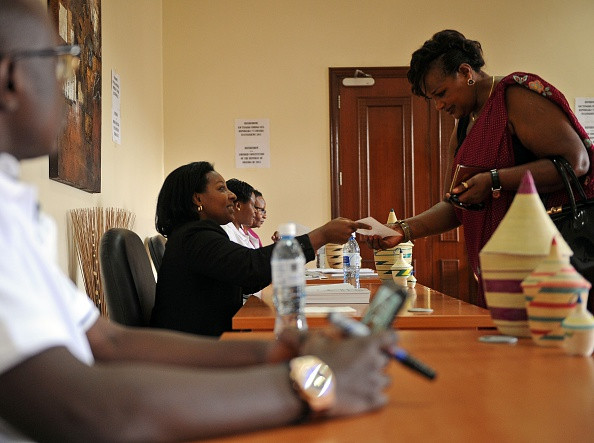Rwanda referendum on Paul Kagame third term under way as opposition says 'no' has chance to win

More than six million Rwandans are heading to the polls to vote on a referendum on proposed constitutional changes to allow President Paul Kagame to run for a third term. An estimated 38,000 Rwandans living abroad voted on 17 December, with results expected early next week.
The referendum was scheduled earlier in December after the parliament backed a proposal to amend article 101 and allow Kagame to run in the 2017 election. He has been president of Rwanda since 2000 and, at present, is bound by the constitution to step down after serving two consecutive seven-year terms.
However, some 3.8 million Rwandans are believed to have signed a petition calling for a third term for Kagame. The leader – seen by many as the man who stopped the genocide that caused the death of at least 800,000 Tutsis and moderate Hutus in 1994 – said he will make a decision on the future of his political career after the referendum.
Should voters approve the constitutional changes, Kagame could be re-elected in 2017 and stay in power for two subsequent five-year terms under the terms of the amendment, potentially until 2034.
A total of 6,392,867 Rwandans will vote in the #referendum. These include approx. 40k from the Diaspora who voted yesterday #RwandansDecide
— Government of Rwanda (@RwandaGov) December 18, 2015Happy to have been part of those deciding the destiny of our country! #RwandaDecides! pic.twitter.com/gMPKFKvbzf
— Willy Rukundo (@Ibingira) December 18, 2015She's very excited for exercising her right this morning & cast her vote. Her message 2 da reporters @hrw abt Rwanda pic.twitter.com/9zD0qEpN2n
— Fred Mufulukye (@Fredrwanda) December 18, 2015Some analysts have argued Kagame is likely to be able to run in 2017 election. Many people want him to stay in power, as they have been experiencing peace and economic development.
On the other side, Kagame has been accused of cracking down on political opponents and freedom of speech, implementing a climate of fear. The government denies these allegations claiming a change of the constitution is the result of the population's will.
A delegation of foreign envoys in Rwanda expressed concern at the speed with which the referendum was being held as well as the lack of public debate. However, Senator Tito Rutaremara told diplomats the debate on the referendum started five years ago and Rwandans had time to understand and discuss their options.
Speaking to IBTimes UK, Rutaremara said: "The referendum has been asked by the population. Nearly four million people signed the petition and this is why Rwanda is holding a referendum. It is legal and guaranteed by the constitution."
Opposition
Frank Habineza, leader of the country's only opposition party – the Democratic Green Party of Rwanda (DGPR) – told IBTimes UK he is against the changes. He said: "Many people are saying that since 3.8 million petitioned the parliament to change the constitution, they will vote 'yes'. It's about 60% of all the voters. But also I know that those figures were not verified so I think even the 'no' side has a chance to win."
He added that his party will run in the 2017 election even if constitutional changes are approved: "The party will present a candidate; that could be me or some else."
Complex scenario
Phil Clark, reader in international politics at Soas University, told IBTimes UK the current scenario in Rwanda goes beyond the fact people are simply either pro or anti-Kagame. He said: "Over the 13 years, I've been researching in the Rwandan countryside, people's political views have been much more complex than that.
"There are concerns over Kagame staying too long in power. At the same time, many people fear what may happen if he leaves, given Rwanda's history of violent transitions.
"There is also broad recognition of Kagame's, and the Rwanda Patriotic Front's, ability to improve the lives of everyday Rwandans, especially in terms of education, healthcare and the general stability of the country. Many Rwandans hold all of these views simultaneously, which reflects the country's complex history and the complexity of people's lives today."
© Copyright IBTimes 2025. All rights reserved.





















